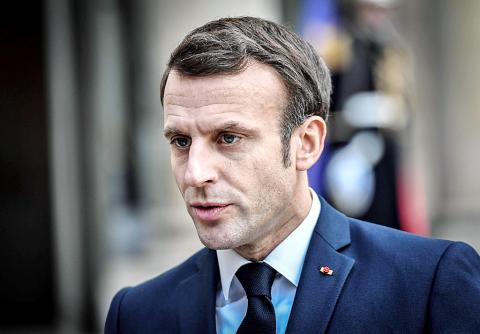France, the EU’s sole nuclear power since Britain’s exit from the bloc, was to unveil how it intends to use its atomic arsenal as a deterrent.
French President Emmanuel Macron, in an address to military officers graduating in Paris yesterday, was expected to recommit to upgrading France’s capacity, at a time when NATO allies, who would ordinarily look to the US in a nuclear standoff, worry about Washington’s retreat from the multilateral stage.
On Monday, Macron said that his speech would address the interests of other European countries.

Photo: AFP
“I will focus on the doctrine [of French deterrence], but also on the procedures and modalities that I wish to propose on this topic to our partners in the coming months,” he said on a visit to Warsaw.
Deterrence theory postulates that countries with nuclear weapons are less likely to attack each other for fear of mutual destruction, meaning the arms serve as guarantors of peace.
France considers nuclear deterrence a keystone of its defense strategy and the ultimate guarantee of its most vital interests.
Macron has already agreed to a costly modernization of France’s atomic arsenal, saying in January 2018 that “deterrence is part of our history, part of our defense strategy, and will remain so.”
An act of parliament provides for about 37 billion euros (US$41 billion) to be spent on the maintenance and modernization of the French nuclear arsenal from 2019 to 2025 — about 12.5 percent of the total defense budget for those seven years.
Macron’s address comes after Russia and the US last year withdrew from the Soviet-era Intermediate Range Nuclear Forces treaty.
Macron in December last year said that the treaty’s end meant that “France, Germany, and other European countries are now threatened by new Russian missiles.”
Washington has also since threatened not to renew the New START treaty with Russia, the last key nuclear deal between the former Cold War foes.
The treaty, which expires this month, obliged both sides to halve their number of strategic nuclear missile launchers and establish a new verification regime.
Corentin Brustlein, research director at the Paris-based French Institute of International Relations, said that Europe has always been a strong focus of France’s nuclear vision.
There had been several French attempts at dialogue with European partners on the topic “that have never succeeded,” Brustlein said.
However, “the balance is shifting, including in countries such as Germany” where public opinion is deeply anti-nuclear and the subject remains largely taboo, but “where we see emerging positions on the level of European strategic ambition that must grow,” he said.
On Monday, a senior member of German Chancellor Angela Merkel’s Christian Democratic Union pleaded for the EU to create its own nuclear deterrence capability.
Germany should “consider cooperation with France regarding nuclear weapons” and “should be prepared to participate in the nuclear deterrent force with its own capabilities and means,” Johann Wadephul said in an interview with the Tagesspiegel daily.

POLITICAL PRISONERS VS DEPORTEES: Venezuela’s prosecutor’s office slammed the call by El Salvador’s leader, accusing him of crimes against humanity Salvadoran President Nayib Bukele on Sunday proposed carrying out a prisoner swap with Venezuela, suggesting he would exchange Venezuelan deportees from the US his government has kept imprisoned for what he called “political prisoners” in Venezuela. In a post on X, directed at Venezuelan President Nicolas Maduro, Bukele listed off a number of family members of high-level opposition figures in Venezuela, journalists and activists detained during the South American government’s electoral crackdown last year. “The only reason they are imprisoned is for having opposed you and your electoral fraud,” he wrote to Maduro. “However, I want to propose a humanitarian agreement that

ECONOMIC WORRIES: The ruling PAP faces voters amid concerns that the city-state faces the possibility of a recession and job losses amid Washington’s tariffs Singapore yesterday finalized contestants for its general election on Saturday next week, with the ruling People’s Action Party (PAP) fielding 32 new candidates in the biggest refresh of the party that has ruled the city-state since independence in 1965. The move follows a pledge by Singaporean Prime Minister Lawrence Wong (黃循財), who took office last year and assumed the PAP leadership, to “bring in new blood, new ideas and new energy” to steer the country of 6 million people. His latest shake-up beats that of predecessors Lee Hsien Loong (李顯龍) and Goh Chok Tong (吳作棟), who replaced 24 and 11 politicians respectively

Young women standing idly around a park in Tokyo’s west suggest that a giant statue of Godzilla is not the only attraction for a record number of foreign tourists. Their faces lit by the cold glow of their phones, the women lining Okubo Park are evidence that sex tourism has developed as a dark flipside to the bustling Kabukicho nightlife district. Increasing numbers of foreign men are flocking to the area after seeing videos on social media. One of the women said that the area near Kabukicho, where Godzilla rumbles and belches smoke atop a cinema, has become a “real

‘WATER WARFARE’: A Pakistani official called India’s suspension of a 65-year-old treaty on the sharing of waters from the Indus River ‘a cowardly, illegal move’ Pakistan yesterday canceled visas for Indian nationals, closed its airspace for all Indian-owned or operated airlines, and suspended all trade with India, including to and from any third country. The retaliatory measures follow India’s decision to suspend visas for Pakistani nationals in the aftermath of a deadly attack by shooters in Kashmir that killed 26 people, mostly tourists. The rare attack on civilians shocked and outraged India and prompted calls for action against their country’s archenemy, Pakistan. New Delhi did not publicly produce evidence connecting the attack to its neighbor, but said it had “cross-border” links to Pakistan. Pakistan denied any connection to